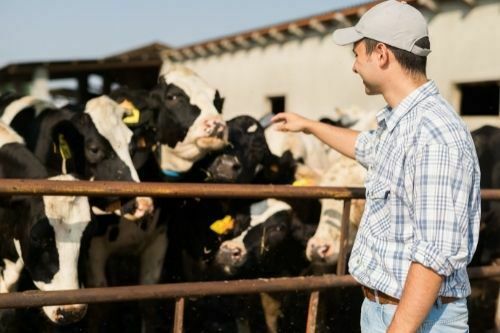Table of Contents
Agriculture is regarded as the backbone of the country. Pursuing this degree will provide you with several opportunities to conduct research and apply cutting-edge technology to achieve successful growth and increased crop yields. Graduates who look for a career in agriculture after 12th can find employment in a wide variety of government, private, and public institutions, research centers, and agriculture businesses. The following is a list of some of the most common job fields available to graduates of this course –
- Government Research Institutes
- State Agricultural Universities
- Seed Manufacturing Companies
- Food Technology Companies
- Fertilizer Manufacturing Firms
- Food Processing Units
- Central & State Government Departments
- Schools & Colleges
- Machinery Industries
The agricultural industry has seen a dramatic surge in the demand for professionals over the last few years. The modernization of Agriculture and agricultural processes have increased the demand for a specialist who can engage in research & development and administration.
To ensure crop growth is enhanced while input costs are kept to a minimum. Pursuing a BSc in Agriculture will familiarise you with agricultural fundamentals, and innovative and sophisticated technology in the sector. You also understand water resource management, soil texture, and poultry managementfundamentals.
There are many career opportunities in agricultural science in both the public and private sectors. After earning a BSc in Agriculture, you will need to pass a series of competitive tests (detailed in the next section). However, the majority of employment you will come across during your campus placement will be in the private sector.
Following are some of the most prominent government and business sector occupations available –
| Job Profile | Average Salary Per annum | Highest Salary Per annum |
| JRF/SRF | 2 Lakhs | Varies |
| Research Assistant | 3 Lakhs | 3.5 Lakhs |
| Seed Technologist | 3 Lakhs | 5 Lakhs |
| Agriculture Technician | 3.5 Lakhs | 4 Lakhs |
| Marketing Executive | 3.5 Lakhs | 6 Lakhs |
| Animal Breeder | 4 Lakhs | 12 Lakhs |
| Project Associate | 4.2 Lakhs | 6 Lakhs |
| Agriculture Analyst | 4.2 Lakhs | 6 Lakhs |
| Agriculture Sales Officer | 4.80 Lakhs | 10 Lakhs |
| ICAR Scientist | 7 Lakhs | 15 Lakhs |
| Plant Breeder | 7.7 Lakhs | 14 Lakhs |
| Agricultural Officer | 9 Lakhs | 14 Lakhs |
Agriculture officer

The agricultural officer’s position is one of the most desirable and well-compensated government occupations in India. This position carries a great deal of status and distinction, and thousands of students apply for it each year. However, before you prepare for the qualifying exam, learn everything you can about this position, and its roles and responsibilities. This will undoubtedly help you gain a better understanding of it, and you may move appropriately. Agriculture officers must ensure that all agricultural practices and products comply with federal, state, and local laws.
ICAR scientist
Agri scientist is a specialist who evaluates various farming and food production systems in order to maximize crop productivity. He conducts research to develop new and inventive methods for improving the quality of food grown and supplied.
Agriculture analyst
Agri research analysts monitor the agricultural commodities market for trends and patterns in supply and demand. The analyst also evaluates price patterns and assists with the development of price forecasting models. This is an excellent opportunity for a career in agriculture after graduation.
Agriculture sales officer
An agricultural sales professional specializes, performs, and demonstrates his sales skills in the domain of agricultural products. Because the products they deal with range from fertilizers to heavy machinery, a deep understanding of the agriculture industry and a strong sales background are both necessary for success in this profession.
Marketing executive
Marketing is a critical career in agriculture since it entails getting a commodity from the production phase to the consumption phase. Agricultural marketing executives work on several cross-departmental tasks, involving production planning, growing, harvesting, packaging, shipping, as well as selling the product to customers. Marketing executives analyze current market trends in order to communicate with farmers about which items to produce and when to produce them. They increase customer satisfaction by conveying product prices and availability promptly. Excellent marketing executives can increase public awareness and consumption of a certain product while enhancing farmer and producer income.
Research assistant
This is another interesting career in B.Sc agriculture. Research assistants aid researchers who are conducting experiments or collecting and evaluating data and information. Medical research institutes think tanks, consulting firms, public interest groups, colleges, polling organizations, and market research corporations are all common jobs. Their responsibilities will vary significantly depending on the type of research environment in which they work.
Project associate
A project associate (PA) is another type of career in agriculture. PA is a specialist who ensures that a project’s operation is smooth and accurate.
Plant breeder
Plant breeders are essentially genetic engineers whose primary goal is to improve crops via the use of various breeding techniques. The majority of breeding aims will be similar to those of prior eras. Breeders, however, will optimize the classical processes. This results in the extraordinary expansion of breeding tools, particularly those generated from biotechnology and molecular genetics. This is another great research career in agriculture.
Animal breeder

Farm animal breeding is the process of providing the next generation in animal production. Agricultural animals continue to improve generation after generation, thanks to animal breeding. Animal characteristics are quantified based on different biological factors. This helps in identifying the best pair of livestock for breeding. Farm animal breeders are crucial to sustaining a healthy and sustainable food supply chain.
Agriculture technician
Agronomists and agricultural technicians assess the impact of the environment on crops in order to enhance an operation’s total performance. They do this by performing research and experiments on farms, collecting and analyzing data, and writing reports based on their findings. Agriculture technicians have a plethora of career opportunities in agriculture that can be gained with a B.Sc in Agriculture.
Key takeaways
In spite of the widely held belief among the public that agricultural courses are restricted in their application, those that pursue careers in agriculture have a broad range of career options because they are well-versed in multiple disciplines such as plant biochemistry and genetics with animal and insect sciences. They can also work in fields such as agricultural production, economics and biotechnology, soil science, and pathology. There is a wide range of occupations available after completing a B.Sc in Agriculture.
Liked this blog? Read next: All you need to know about the Agriculture courses
FAQs
Q1 – How do I gain a government position after earning a BSc in agriculture?
Answer – After completing your BSc in Agriculture, you can appear for different government exams to gain a job in the public sector. Some of these tests include the UPSC-IFS, the SSC State Forest Exam, and the IBPS SO exam.
Q2 – Is agriculture a good career?
Answer – A career in Agriculture is one of the largest industries and a good source of employment across the country.
Q3. Which country offers the best opportunities for farm jobs?
Answer – France, Spain, Ireland, and Germany are all attractive places to work in agriculture.






